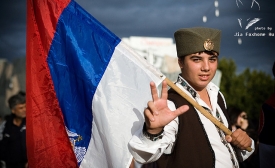public opinion
Views of the US around the world have improved sharply over the past year, according to a BBC World Service poll. For the first time since the annual poll began in 2005, America's influence in the world is now seen as more positive than negative.
In 2004, when the Indian Ocean tsunami hit a number of countries, the coastal regions of Indonesia and Sri Lanka were devastated. Before the tsunami, the public opinion of the United States in these and surrounding Muslim countries was predictably low; however the huge efforts of US humanitarian aid immediately following as well as long after the crisis swayed public opinions that remained high even a year later in a follow-up poll.
Cultural historians mostly discourage making cross-history comparisons of important events, since they take place in fundamentally different contexts and the parallels that are drawn are rarely meaningful or useful. With that caveat, I will argue how President Obama's administration might best utilize the soft power of cultural diplomacy by recalling a similarly pivotal moment from March 4, 1933.

This case study examined the effectiveness of the U.S. media strategy at four crucial moments prior to and during the conflict: the Racak massacre, the Rambouillet conference, the first days of the air campaign and Serbian ethnic cleansing, and the endgame.







